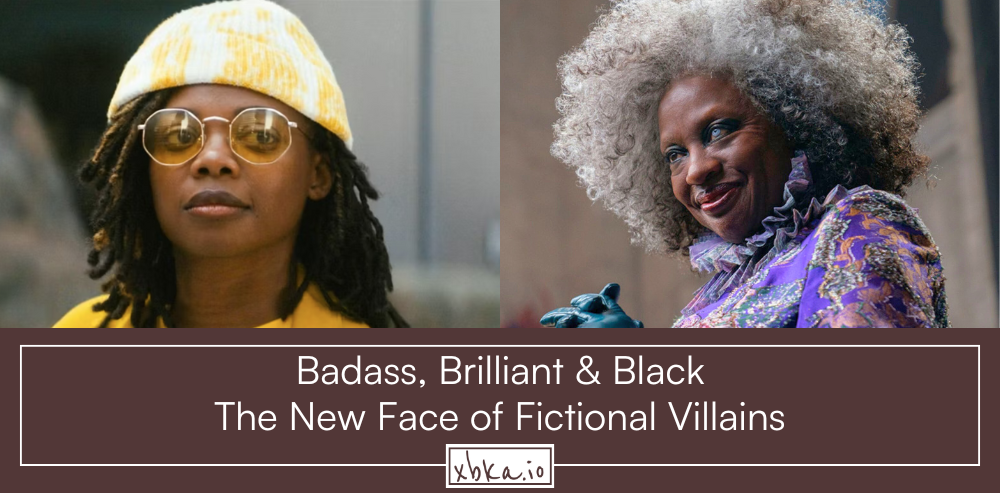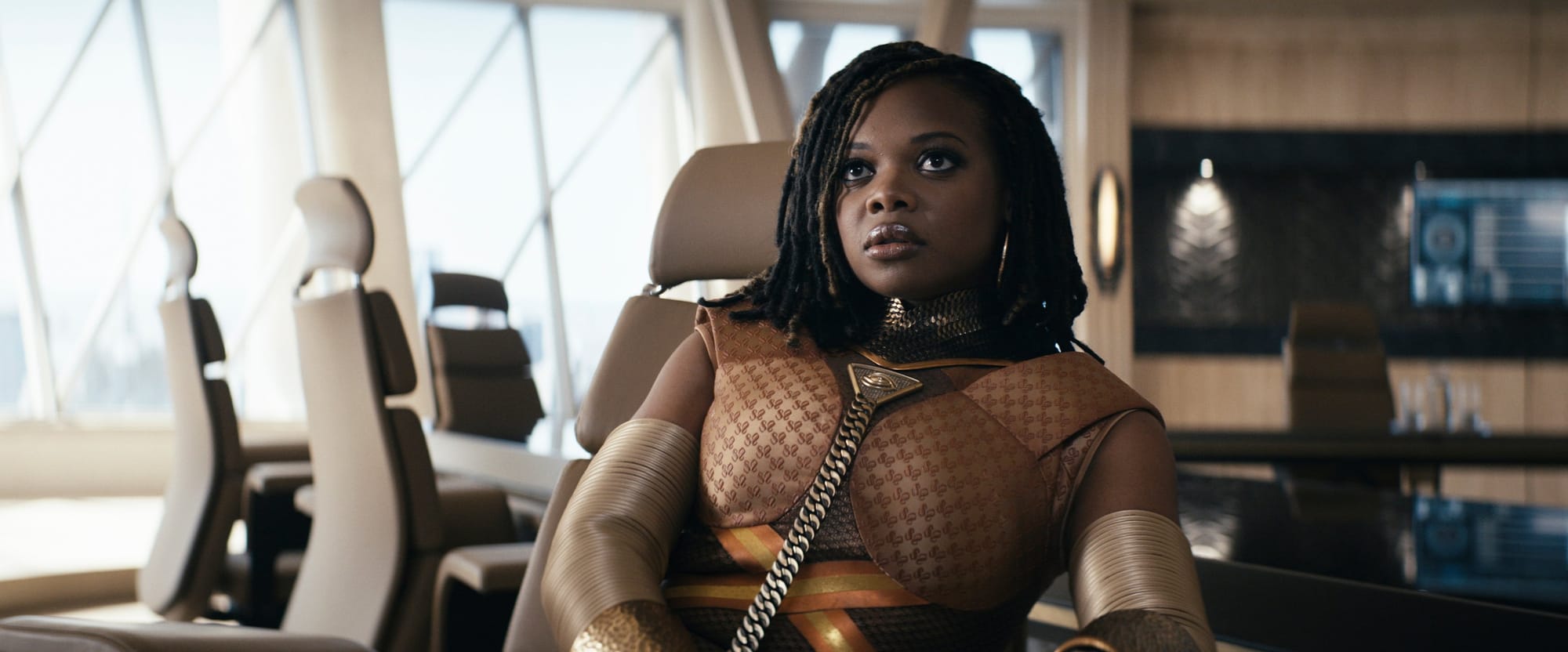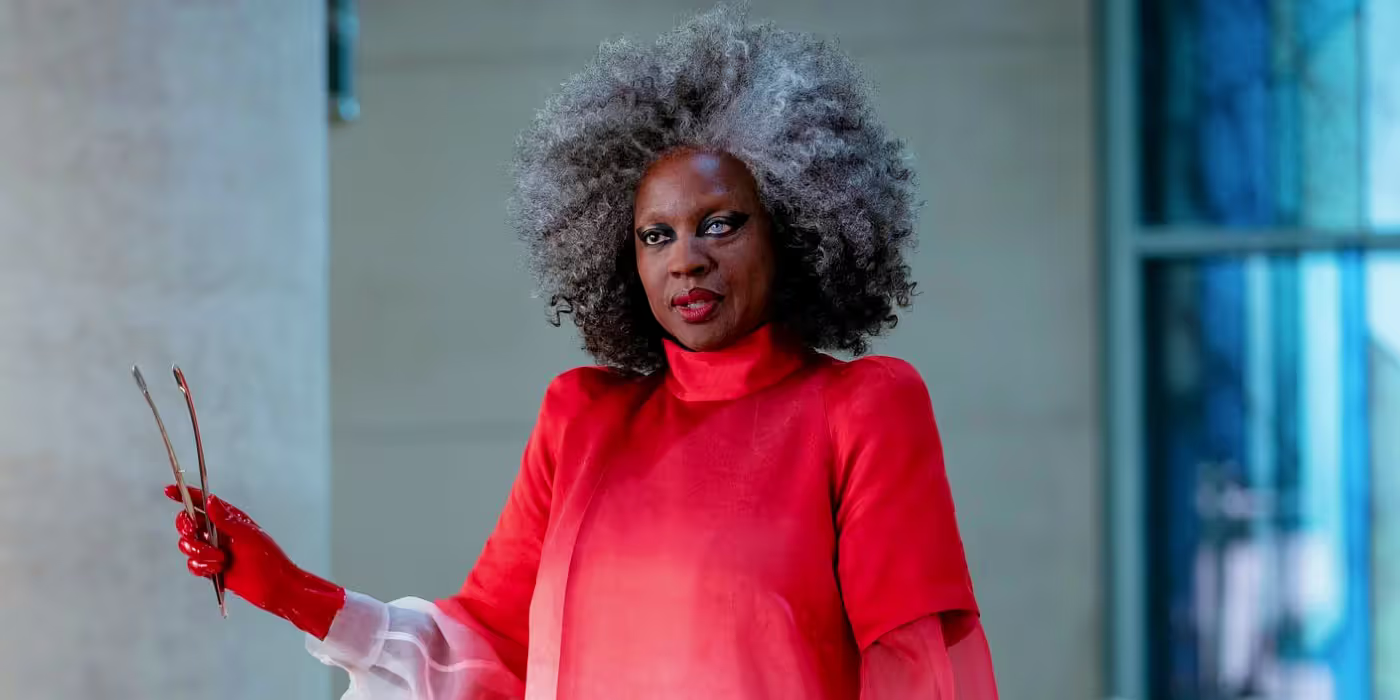Badass, Brilliant & Black: The New Face of Fictional Villains
Just rewatched The Boys and The Hunger Games: The Ballad of Songbirds and Snakes prequel back-to-back, and I'm calling it now: brilliant, morally grey Black women are the future of fictional baddies.

Move over, brooding white guys with daddy issues! There's a new archetype in town, and she's bringing brains, side-eye, and a hefty dose of misanthropy to the table. I'm talking about powerful, intellectually gifted Black women as the next big thing in fictional antagonists. At least, that's what I've gleaned from the whopping two sources I've chosen to base this sweeping generalization on. Let's dive into the fascinating world of Sister Sage from The Boys and Dr. Gaul from The Ballad of Songbirds and Snakes.
Now, before you accuse me of jumping the gun, I'll admit this isn't exactly a full-blown trend... yet. We've seen brilliant Black female antagonists before—Amanda Waller in DC Comics, Fish Mooney in Gotham, Maeve Millay in Westworld, to name a few. But there's something about Sister Sage and Dr. Gaul that feels different, more potent.
It's worth noting that portrayals of Black women as villains have a complex history in media. From Eartha Kitt's Catwoman to Grace Jones's May Day, these characters have often walked a fine line between breaking new ground and reinforcing harmful stereotypes like the "hypersexualized Black woman" or "angry Black woman." Some, like Angela Bassett's Marie Laveau, offered depth but still risked falling into tropes like the "magical Negro." Others, like Viola Davis's Amanda Waller, have managed to present more nuanced, stereotype-defying portrayals.
While we could dive deep into how these characters' Blackness and womanhood intersect with their roles (and believe me, the folks behind The Boys are practically begging us to go there), that's a topic best left for a longer essay. Instead, let's focus on what makes these women such compelling antagonists.
In this post, I'll argue that characters like Sister Sage and Dr. Gaul represent a potential new trend in fictional antagonists: the widening of quality representation in media of brilliant, morally complex Black women whose intellect and disillusionment with humanity drive their actions. By examining these characters, we'll explore how they challenge traditional villain stereotypes and what their emergence might mean for the future of character development in popular fiction.
If I'm early to what turns out to be the next big thing in character archetypes, you bet I'll be insufferably smug about it. But more importantly, I hope this analysis contributes to the ongoing conversation about representation and character complexity in popular media.
The Smartest Person in the Room (and She Knows It)
Sister Sage: Brains Over Brawn

Known as "the smartest woman person in the world," Sister Sage is a new formidable force in The Boys universe as of Season 4. Instead of possessing higher-than-average physical power like most heroes on her team (The Seven), Sage has a super-intellect, making her the most intelligent sentient being on the planet.
With hyperintelligence, you'd think she'd be running the world, but in true fashion for The Boys, her great intellect has made her a misanthrope. From her first appearance, Sage establishes herself as a force to be reckoned with ("Department of Dirty Tricks"):
Sage: Smartest person. And that person is too smart to give a fuck about Pottery Barn.
[...]
Homelander: What kind of legacy am I going to leave to my son? A shithole country in a shithole world? Or something better? Something... pure and cleansed. Like, marble.
[...]
Sage: Rome, Greece, all democracies... They fell because people are fucking stupid. [...] If you crush the masses, who builds your monuments? Who tongues your taint? No. The people will tear it apart themselves, just gotta nudge 'em a little. Then you get to swoop in, be the one saving it.
But The Boys goes further than just making her a misanthrope because "woe is me, heavy is the head that holds the brain." Rather, in later episodes, they ground her present-day discontent with society by centering it around the cold, hard fact that white men in positions of power would not take seriously the achievements of a little Black girl whose intelligence outshone their own ("Dirty Business"):
I stayed up the next three nights and discovered a cure. Presented my research to those satisfied fat crackers, they patted me on the head, said I was adorable, and laughed at me. Grandma died screaming in pain.
I could cure cancer, reverse global warming, but what's the point? Humans are animals. And the lines at Voughtland are too long as it is.
This isn't just garden-variety misanthropy; it's a bitterness born from a lifetime of being underestimated and ignored. Sage's intellect isn't just her superpower; it's her curse. She has to live with the fact that she is beyond capable of greatness but is always kept from it.
Dr. Gaul: The Mad Scientist with a Method

Meanwhile, in the world of "The Hunger Games," we have Dr. Volumnia Gaul, the mentor figure that molds Coriolanus Snow into the President of Panem that we meet by the 74th Hunger Games. If Sister Sage is the epitome of wasted potential, Dr. Gaul is what happens when that potential is given free rein in all the wrong directions.
Dr. Gaul wears many hats: Head Gamemaker, Head of the Capitol's Experimental Weapons Division, Professor of Military Theory, and former obstetrician. It's like she looked at the career aptitude test and said, "Why choose?" At least within the context of her research, she is known for her indifference-bordering-cruelty where her test subjects are concerned.
Similar to Sage, Dr. Gaul didn't become a raging misanthrope for the sake of it. Her backstory hints at a similar disillusionment with humanity:
How awful, Coriolanus thought. To have you be the first person in the world a baby sees.
"Wasn't really for me," said Dr. Gaul. "Parents always want reassurances you can't give. About the futures their children face. How could I possibly know what they'd encounter? Like you tonight. Who would have imagined Crassus Snow's darling baby boy fighting for his life in the Capitol Arena? Not him, for one" (Collins 241-242).
Playing 4D Chess While Everyone Else is Playing Checkers
What sets these women apart isn't just their intelligence; it's how they wield it. They're not content to sit back and pull strings from the shadows. No, they're right in the thick of things, manipulating events with a finesse that would make Machiavelli blush.
Sister Sage
Sister Sage doesn't just predict human behavior; she orchestrates it. She's the puppet master who not only sees the strings but knows exactly how to pluck them for maximum effect. Her strategies have more layers than an onion wrapped in phyllo dough, with contingencies for her contingencies.
In addition to being able to process massive volumes of information, Sage is also able to execute on it provided she has a vehicle to do so. For example, her inability to cure cancer was due to not having access to the technology the medical professionals were gatekeeping. That said, her power manifests in creating strategies that manipulate human psychology and have redundancies when the unexpected factor occurs whether that be an outside influence or an error in her own calculation.
As I mentioned, Sage is accustomed to being limited to dealing with humans, so her acting and interpersonal skills are sharp. She maintains her position by being keenly aware of everything going on around her and not being afraid to intervene by employing a range of tactics, from subtle persuasion to outright intimidation to achieve her goals.
A key point to remember about Sister Sage is that she's not afraid to take risks. Her misanthropy seems to extend at least the borders of her own sense of self-preservation because although she'd prefer to direct her meat puppets from behind the scenes, she's comfortable getting her hands dirty in the field. From the first time we meet her until the very end, she has seemingly spoken her mind plainly to Homelander (risking certain death each time) and coming out unscathed in ":Season Four Finale."
LITERALLY MAJOR SPOILERS. THIS IS LITERALLY THE LITERAL END OF THE LITERAL SEASON. LITERALLY.
Dr. Gaul
Dr. Gaul, on the other hand, turns manipulation into an art form. The Hunger Games aren't just a tool for control; they're her personal petri dish for human behavior. She doesn't just observe; she creates scenarios designed to strip away the veneer of civilization.
Dr. Gaul’s method is marked by her cold, analytical approach to human behavior. While she states clearly that she sees humans as barbaric animals, we can presume that she values human life a lot less than the results of any lessons gained from their deaths.
While Dr. Gaul views the Hunger Games as a necessary tool for maintaining social order, she uses that justification to conduct brutal experiments on the tributes via her position in the War Department. She also isn't above risking the lives of elite Capitol citizens to prove a point. This is demonstrated at least twice. First, in her Citadel lab when she tested Clemensia Dovecote, whose dishonesty led to her being bitten by at least 10 genetically mutated snakes (Collins 114). And second, when she sent Coriolanus into the Hunger Games arena under the cover of darkness on an extraction mission where he was very nearly killed as a way to illustrate her views on the façade of society:
The idea, laid out as such, shocked him, but he attempted a laugh. “Are we really as bad as all that?”
“I would say yes, absolutely. But it’s a matter of personal opinion.” Dr. Gaul pulled a roll of gauze from the pocket of her lab coat. “What do you think?” (Collins 243).
Dr. Gaul's methods show a mix of scientific inquiry justified by the ruthless desire to enforce the Capitol’s dominance, as per her job description (probably). Her interactions with Coriolanus reveal her belief in the inherent savagery of humans, which she uses to justify her actions.
Conclusion
What makes Sister Sage and Dr. Gaul so fascinating isn't just their brilliance or their ruthlessness. It's the way they challenge our expectations of what a villain should be. They're not cackling madwomen or one-dimensional evil geniuses. They're complex, nuanced characters whose actions, however morally questionable, stem from a place of deep disillusionment with humanity.
These women force us to confront uncomfortable truths about power, intelligence, and the darkness that can arise when brilliance meets bitterness. They make us question whether their actions, however extreme, might be justified given their experiences and insights. And in a media landscape often dominated by muscle-bound heroes and mustache-twirling villains, Sister Sage and Dr. Gaul offer a refreshing—if unsettling—change of pace.
So, are brilliant, morally ambiguous Black women the future of fictional antagonists? It's too soon to say for sure. But they are if Sister Sage and Dr. Gaul are any indication.
By highlighting these characters, I hope to spark thought about the evolution of antagonists in fiction and how characters like Sister Sage and Dr. Gaul reflect changing perspectives on intelligence, power, and morality in our storytelling, especially when it comes to Black women.
Collins, Suzanne. The Ballad of Songbirds and Snakes. Scholastic Press, 2020.
"Department of Dirty Tricks." The Boys, created by Eric Kripke, season 4, episode 1, Amazon Studios, 2024.
"Dirty Business." The Boys, created by Eric Kripke, season 4, episode 6, Amazon Studios, 2024.
"Season Four Finale." The Boys, created by Eric Kripke, season 4, episode 8, Amazon Studios, 2024.
:x The Boys Universe
A series known for its gritty and realistic portrayal of superheroes, viewer discretion is highly advised. Trigger warning for literally everything ever.
:x The Ballad of Songbirds and Snakes
:x Assassination Run
The original name of the episode, "Assassination Run", was changed in the wake of the assassination attempt on former President Donald Trump five days before release.
